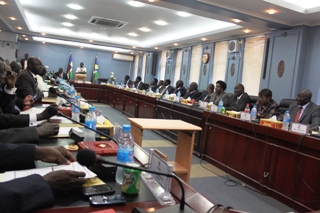South Sudan cabinet denies official media access to its meetings
August 18, 2013 (JUBA) – The newly sworn-in cabinet of South Sudan’s government has passed a resolution denying its state-owned media officials access to the cabinet meetings for the first time after seven years, citing secrecy and confidentiality as the basis for the decision.

An official close to the cabinet affairs told Sudan Tribune on Saturday that the resolution dismantled membership of the cabinet secretariat. He explained that the secretariat always included senior personnel responsible for taking minutes and preparing resolutions as well as senior representatives of the official media, particularly those employed in the office of the president and the cabinet affairs.
Since year 2006 when the region was still governed by a semi-autonomous government, prior to independence and until the dissolution of the last cabinet on 23rd July 2013, such senior representatives from the official media had been part and parcel of the cabinet secretariat, he said, further explaining that they had been attending the meetings for the last seven years to cover the resolutions and assist the minister of information in disseminating them to the private media.
The press officials were however suspected of passing to public the spirit of discussions and things that transpired in the cabinet meetings, hence became a target in the first meeting of the new cabinet during a discussion on implementation of cabinet resolutions presented by the new minister of cabinet affairs, Martin Elia Lomuro.
Journalists covering the parliament’s deliberations last week were also chased out of parliament by the speaker, James Wani Igga, during the vetting of the new ministers.
The new minister of information and broadcasting, Michael Makuei Lueth, on taking his new portfortlio this week, announced on the state-owned South Sudan Television (SSTV) that he would not tolerate media houses or journalists that “write about anything” .
PUBLIC REACTIONS
The decision attracted mixed public reactions in a nation which still struggles to differentiate what should be classified and unclassified information.
A junior staff in the ministry of information, who did not want his name mentioned for fear of reprisal, wondered how the cabinet could disown its personnel.
“What is their [cabinet] problem? Why would they pass generalized judgment on innocent personnel based on mere suspicion?” he asked, adding they should only discipline or replace anybody they suspected to have passed sensitive information which they thought were not for public consumption.
Joseph Garang, a student in Juba, commended the decision to expel the media officials from cabinet, saying cabinet discussions were supposed to be conducted in secrecy while resolutions treated confidential.
“I do commend the resolution of the cabinet which bans the media officials from attending the cabinet meetings. There are sensitive issues that can be discussed in the cabinet and therefore there is need to make sure that they are not passed on to the public by those who attended such meetings,” he said.
Paul John who works with an NGO in Juba however disagreed, saying the resolution was not even a solution.
“I don’t think it is the media officials alone that share the spirit of cabinet discussions or contents of the resolutions with the public. The ministers themselves are the ones that come out from those meetings and start to talk about the things they discussed”, he argued, saying both the ministers and members of the secretariat need to take oath on confidentiality if need be.
He however said there was nothing wrong in making the public to know what the cabinet had been doing unless there were particular special sensitive security issue to discuss, and if that happens, they can simply excuse the officials to leave the room.
(ST)
